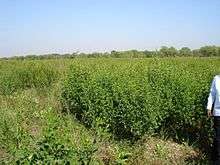Chlorophytum borivilianum
| Chlorophytum borivilianum | |
|---|---|
| Scientific classification | |
| Kingdom: | Plantae |
| Clade: | Angiosperms |
| Clade: | Monocots |
| Order: | Asparagales |
| Family: | Asparagaceae |
| Subfamily: | Agavoideae |
| Genus: | Chlorophytum |
| Species: | C. borivilianum |
| Binomial name | |
| Chlorophytum borivilianum | |
Chlorophytum borivilianum is a herb with lanceolate leaves, from tropical wet forests in peninsular India. The Hindi name is safed musli (also commonly known as musli).
It is cultivated and eaten as a leaf vegetable in some parts of India, and its roots are used medicinally as a sex tonic under the name safed musli. The medicinal value is thought to derive from its saponin content, up to 17 percent by dry weight. It has also recently been suggested that it may produce an aphrodisiac agent. As medicinal demand has increased, the plant has been brought under cultivation. The saponins and alkaloids present in the plant are the source of its alleged aphrodisiac properties.[1] In traditional Indian medicine it is used as 'Rasayan' or adaptogen.[2]

References
- ↑ Oudhia, Pankaj. "Problems perceived by safed moosli (Chlorophytum borivilianum) growers of Chhattisgarh (India) region: a study." Proceedings of the national seminar on the frontiers of research and development in medicinal plants.. Vol. 22. No. 4a. 2000.
- ↑ F. Thakur M., Bhargava S., Dixit V.K. "Immunomodulatory activity of Chlorophytum borivilianum Sant." Evidence-based Complementary and Alternative Medicine. 4 (4) (pp 419-423), 2007
- Safed Moosli (Chlorophytum borivilianum L.): Medicinal and Wonder Crop
- Safed Musli (Chlorophytum species) - A Wonder Drug in the Tropical Zone